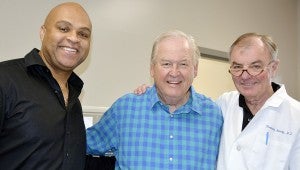100-plus participate in free prostate screenings
Published 2:00 am Tuesday, March 24, 2015

Messenger photo/Jaine Treadwell
Drs. Michael Bivins, left, and Tom Moody, right, Urology Centers of Alabama in Birmingham conducted free prostate cancer screenings at the Pike County Health Department Saturday. Mike Amos, host of Troy Cable’s “Today in LA” joined Bivins and Moody in recognizing the importance for early detection for prostate cancer.
More than 100 men participated in the free prostate cancer screenings offered by Urology Centers of Alabama in Birmingham at the Pike County Health Department Saturday.
Sherry Wilson said 47 percent of those tested in the annual free screenings were participating for the first time. Fifty-six percent of those tested were African Americans.
Wilson said there is a higher incidence of prostate cancer among African Americans than Caucasians, and it is encouraging that more African Americans are being tested.
Dr. Michael Bivins, urologist and surgeon with Urology Centers of Alabama in Birmingham, said early detection through prostate cancer screenings saves lives.
“At Urology Centers of Alabama, we offer free prostate cancer screenings in an effort to find those patients so they can be treated and cured,” Bivins said.
He recommended that all men ages 50 and older be screened, unless there is a family history of prostate cancer. Then, the screenings are recommended to begin at age 40.
“Family history means father, brother or grandfather,” Bivins said. “These screenings are highly recommended for all African American men because prostate cancer incidence and death rates are higher than in Caucasian men.”
Men in the at-risk categories should have annual checkups that include screenings for prostate cancer.
Other than skin cancer, prostate cancer is the most common cancer in American men and is the second leading cause of cancer death, behind only lung cancer. About one in seven men will be diagnosed with prostate cancer during his lifetime. One man in 38 will die of prostate cancer.
The American Cancer Society estimates that, in 2015, about 220,800 new cases of prostate cancer will be diagnosed and that there will be 27,540 deaths from prostate cancer.
The prostate cancer incidence in Alabama is higher than the United States rate as is the prostate cancer mortality rate.
Prostate cancer can be a serious disease but most men with prostate cancer do not die from it. More than 2.9 million men in the United States who have been diagnosed with prostate cancer at some point are still alive today.



